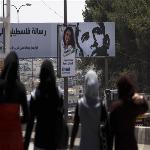03 May 2010

Photo: AP
Palestinian girls walk near a billboard with a picture of US President Barack Obama, in the West Bank city of Ramallah, 3 May 2010. The US Mideast envoy George Mitchell returned to the region on Monday to wrap up preparations for the resumption of indirect Israeli-Palestinian peace talks after more than a year of painstaking efforts.
All sides are expressing cautious optimism that after more than a year and a-half, the peace process may start moving again.
U.S. envoy George Mitchell's agenda this week includes meetings with Israeli officials and shuttling to the West Bank to speak with Palestinian leaders. His job is to prepare the ground for indirect talks that the United States will mediate.
The Israeli prime minister's spokesman, Mark Regev, tells VOA Israel is seeing signs the Palestinians are ready to get the process going again.
"We have received positive indications and we are hopeful that we are about to start now a process of negotiation," said Regev. "We hope that these proximity talks will lead very quickly to direct talks."
The Palestinians say direct talks will not happen until Israel stops building in the occupied West Bank and in East Jerusalem, a precondition they had not placed in prior rounds of negotiations.
A senior Middle East analyst with the International Crisis Group in Jerusalem, Rob Blecher, says frustration over continued expansion of Israeli settlements in the occupied West Bank and East Jerusalem, and the general lack of progress toward achieving a Palestinian state, has prompted the Palestinian leadership to look for new strategies.
"In order to reverse the situation and to give themselves a little bit more leverage, they are turning towards new kinds of ideas or at least ideas that they are pushing forward and making more prominent than they were before," said Blecher.
Those strategies include lobbying the international community, building institutions, and encouraging acts of popular, non-violent resistance against the Israeli occupation.
Palestinian officials say they received assurances from Washington that all core issues would be discussed in the indirect talks. Chief Palestinian negotiator Saeb Erekat spoke at a meeting of the Arab League last week in Cairo.
"What we have from the Americans today satisfied our requests and demands and we hope that we will [see] the deeds not the words," said Erekat.
Blecher says Washington has much confidence-building to do.
"The U.S. needs to demonstrate that its mediation can bear fruit," added Blecher. "This is what the Palestinians are convinced Obama has not shown in the past 18 months. They were expecting a much stronger intervention by Obama last year, in 2009, when Obama stepped back from his demand for a complete settlement freeze and this led Palestinians to feel betrayed and abandoned."
At the same time, the Israeli leadership is suspicious of the Obama administration, which many in Israel believe has not been as favorable as previous U.S. administrations.
Envoy Mitchell's task now is to renew the faith of both Palestinians and Israelis that the United States can produce results - something both sides agree they have not seen so far.